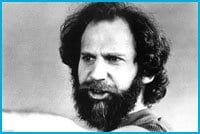David Secter is one of those unsung heroes too common on the Canadian cultural scene.
In 1965, the groundbreaking filmmaker directed Winter Kept Us Warm. This engaging story of a passionate friendship developing between two students at the University Of Toronto received unparalleled international attention. Not only was it the first gay feature made in Canada but the first English-language Canadian feature to be shown at Cannes.
Secter, then a 22-year-old U Of T student, made the film on chutzpah alone – with no budget, no experience and without telling the principals that the main story was a gay love affair.
“He was Canada’s first acclaimed indie filmmaker,” says nephew Joel Secter, director of the fascinating 60-minute documentary The Best Of Secter And The Rest Of Secter. “Canadian film history sort of starts [in 1964] with Don Owen and Nobody Waved Goodbye. And then, obviously, David Cronenberg. And then it skips to 1970 with Donald Shebib and Goin’ Down The Road. But there is this void in the mid ’60s – that needs to be filled with David Secter.”
Cronenberg himself makes an appearance in the doc, calling Winter Kept Us Warm a “shattering revelation.” For the first time the budding director saw his city and his friends onscreen. “It meant you could have access to filmmaking.”
David Secter was there at the birth of Canada as we know it, during the first wave of nationalistic cultural producers whose works influence the way we see ourselves today. Nothing symbolizes that better than Secter’s second film, The Offering from 1966, an interracial love story between a WASP Torontonian and a Chinese acrobat. It’s fitting that one of the main sets was the newly opened City Hall – modern Toronto was just beginning to assert itself.
“Uncle David tells the most incredible anecdotes about filmmaking at those times and how they got away with everything,” says Joel. “He was a true independent filmmaker.”
These first two films feature jazzy soundtracks by Paul Hoffert, founder of famed Canuck rockers Lighthouse. Hoffert makes an appearance in the doc, as do some funky Lighthouse tunes.
While attempting to rewrite the history books, The Best Secter And The Rest Of Secter is an affectionate homage to an eccentric, strong-willed character and a sexual pioneer. “He’s fascinating and far out,” says Joel Secter. “He’s a larger than life kind of guy… unlike anyone I’ve ever known.”
Turning down overtures from Hollywood, David went on to found Total Impact, a communal film studio in New York City where a group of people lived what they were trying to portray in two film projects, a documentary and a feature drama. David was purposefully blending fact and fiction to create a scene where people would get together to marry as a group, have sex, work and raise kids. “We’ re not making a movie,” he says in an old clip. “We’re making history.”
But money was always a problem. To help finance his troubled studio experiment, David starred in the 1977 porno Blow Dry, a parody of Shampoo written by Sam Kitt (who, until recently, was president of Spike Lee’s company Forty Acres And A Mule). Secter got his Winnipeg-based family to invest in the porno; they even came to New York for the premiere.
The feature that came out of Total Impact, Getting Together, no longer exists in its entirety, but a version of it, 1976’s Feelin’ Up, is distributed by Troma and can still be found in video stores. Looking for a lark of a video to watch with friends, a teenaged Joel rented Feelin’ Up from Adi’s in the Winnipeg suburb of Tuxedo. Joel didn’t know of David’s connection to the film until the written and directed by David Secter credit rolled by in the opening – just one of many intriguing ways Joel and David’s lives intersect.
“David began videotaping us as kids at a very early age and always wanted to get his nieces and nephews involved in his projects,” says Joel. “And I was the only one who heeded his call.”
Joel’s doc moves quickly through the latter part of David’s life, introducing us to his partner of the last 25 years Patrick Montana and the couple’s view on David’s HIV-positive status.
It also examines an awful moment in Joel’s life, when he attempted to emulate his uncle’s ballsy approach to filmmaking. At the age of 23 and with no experience, Joel moved to California in 1996 to exec produce Cyberdorm, a film written and directed by David. Joel attempted another David Secter concept – making a second film simultaneously, a documentary on the unusual relationship between uncle and nephew.
Cyberdorm was a disaster from which Joel ran away leaving uncle David to, once again, pull a film out of his ass and complete a project everyone said was doomed. And because Joel had brought along a cameraman, he has footage of his failure.
“It was a very difficult experience,” says Joel. “It was really a crash course film school for me – and I emphasize crash course because I did not see it through.
“So coming undone was really very much part of the story and the reason why I was so compelled to make this documentary. I don’t know if I could have moved forward in my life if I hadn’t come full circle.” Joel has an active film career and currently lives in Toronto with his expectant wife.
As for the man himself, Joel notes jokingly, “David’s not dead.” In fact, David Secter’s documentary on the Gay Games gets its world premiere at New York’s NewFest in June.
The Best Of Secter And The Rest Of Secter ends with David looking back, with his own definition of success still intact. “I continue to daydream with the best of them,” he says. “My fantasies are as farfetched as they’ve always been.”


 Why you can trust Xtra
Why you can trust Xtra


